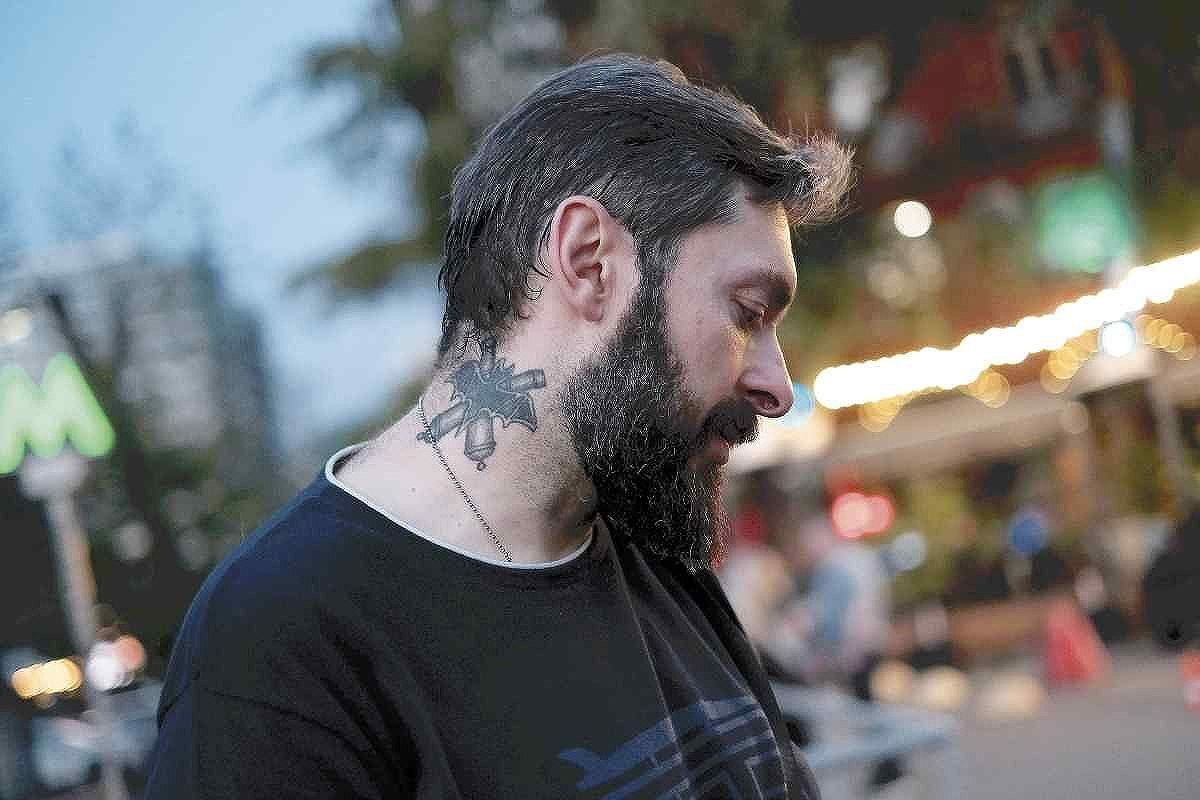Ukrainian POW Relates Beatings, Shocks Given in Russian Prison; Weight Dropped 32 Kg Due to Meager Meals

Maksym Kolesnikov, who spent time as a POW in Russia, is seen in Kyiv on Wednesday.
20:00 JST, August 23, 2024
KYIV — In the 2½ years since Russia invaded Ukraine, the Russian military has tortured Ukrainian prisoners of war and treated them inhumanely. A former Ukrainian soldier who experienced brutal torture for 11 months from around the start of the invasion spoke to The Yomiuri Shimbun on July 8.
The hands of Maksym Kolesnikov, 48, a resident of Kyiv, were trembling slightly as he recounted what happened to him.
Immediately after the aggression began, Kolesnikov, who was then working for a financial institution, volunteered for service, hoping to protect his country. He fought in Makariv, a suburb of Kyiv, against Russian forces that were approaching the capital.
On March 20, 2022, while assigned to protect communications facilities, his base was surrounded by Russian tanks, and his commanding officer decided to surrender. When Kolesnikov and about 50 others threw down their weapons and left the base with their hands raised, the Russians tied their hands, blindfolded them and transported them by car.
When they arrived at a prison in the Bryansk region in western Russia via Belarus, they were tortured to establish control. Mornings and nights, prisoners were called into a corridor one by one and beaten with metal rods and other tools, then dragged across the floor. They were made to run naked through the building and ordered to shout “Glory to Russia.”
The most terrifying part came after showers. Several prison guards would hold the prisoners down and administer electric shocks to their wet bodies. The guards seemed to take joy in the prisoners’ screams and laughed loudly. “Torture seemed to them just a playful distraction,” Kolesnikov said.
According to Ukraine’s state-run news agency, captured Ukrainian soldiers numbered about 8,000 as of January.
Interrogated for secrets
Shortly after being taken captive, Kolesnikov had his DNA sampled and his fingerprints taken, and a 3D image was made of his face. Russia is believed to keep a database on those who participated in the 2014 Maidan Revolution, in which Ukraine’s pro-Russian government was overthrown. Those who matched the data were seen as particularly nationalistic and were sent to Siberia or other prisons with poor conditions.
Kolesnikov was interrogated by Russia’s Federal Security Service (FSB) and the Russian military’s investigative committee, which tried to extract Ukrainian military secrets.
The day before investigations, Kolesnikov would be tortured severely.
The Russians were trying to get information about U.S.-made arms and nuclear weapons held by the Ukrainian military and the political party he supported, but Kolesnikov kept telling them he knew nothing. The cycle of torture and interrogation continued.
Rotten food
Kolesnikov was psychologically abused as well. On New Year’s Eve and the warden’s birthday, it was customary for the prisoners of each cell to perform a song or trick, and they were forced to compete with other cells. The losers were tortured, and the winners were given food taken away from the losers, he recalled.
“We had no choice but to do it to survive, no matter how miserable we were,” he said.
Prisoners were fed old frozen meat, a few slices of potatoes and other meager meals. On one occasion, all the prisoners had severe diarrhea from a soup of rotten meat, but they received no medical treatment. Three prisoners died of torture or disease in prison, and two of them were buried in the courtyard.
Kolesnikov was always hungry and he lost 32 kilograms in weight. His bones were broken by the torture, and he grew weaker and weaker. Despite his languishing body, he was frequently ordered to do 100 push-ups or 200 sit-ups and would get electric shocks if he stopped halfway through.
On top of the various kinds of torture, “the toughest part was that I was cut off from information and had no idea about the situation in Kyiv where my family lives,” he said.
95% of POWs tortured
According to the U.N. Human Rights Monitoring Mission in Ukraine, Russia’s torture of POWs has been systematic and widespread, with 95% of Ukrainian POWs held in Russia subjected to torture. The human rights watchdog has repeatedly condemned the actions as a violation of the Geneva Conventions, which require the humane treatment of captives. Torture of Russian POWs by Ukraine has also been reported.
According to the Ukrainian government, 54 prisoner swaps had taken place by July, and 3,400 soldiers and civilians had returned home. Kolesnikov was released in February 2023 as one of 117 POWs returned in an exchange.
A year and a half later, Kolesnikov still has scars on his legs and buttocks from the torture, and his muscles are still weak. He always carries food in his pockets, as whenever he gets hungry he is haunted by the hunger and fear he felt during captivity.
“Life as a POW left an indelible mark,” Kolesnikov said.
But he has no regrets about joining the army for the sake of his country, and his wife, 41, understands him.
“Ukraine will not bow down. It is a war for our survival,” he said.
Kolesnikov said he was still driven by patriotic fervor, but his leg injury is too serious to allow him to return to the front line.
Top Articles in World
-

China Confirmed to Be Operating Drilling Vessel Near Japan-China Median Line
-

China Eyes Rare Earth Foothold in Malaysia to Maintain Dominance, Counter Japan, U.S.
-

Japan, Qatar Ministers Agree on Need for Stable Energy Supplies; Motegi, Qatari Prime Minister Al-Thani Affirm Commitment to Cooperation
-

North Korea Possibly Launches Ballistic Missile
-

10 Universities in Japan, South Korea, Mongolia to Establish Academic Community to Promote ICC Activities, Rule of Law
JN ACCESS RANKING
-

Univ. in Japan, Tokyo-Based Startup to Develop Satellite for Disaster Prevention Measures, Bears
-

JAL, ANA Cancel Flights During 3-day Holiday Weekend due to Blizzard
-

China Confirmed to Be Operating Drilling Vessel Near Japan-China Median Line
-

China Eyes Rare Earth Foothold in Malaysia to Maintain Dominance, Counter Japan, U.S.
-

Japan Institute to Use Domestic Commercial Optical Lattice Clock to Set Japan Standard Time
























